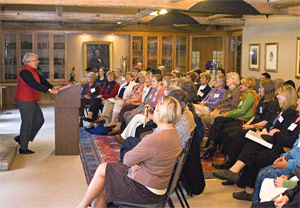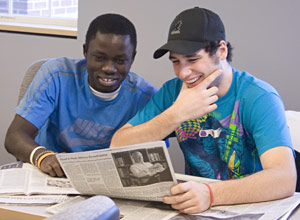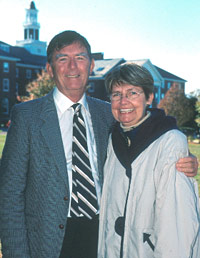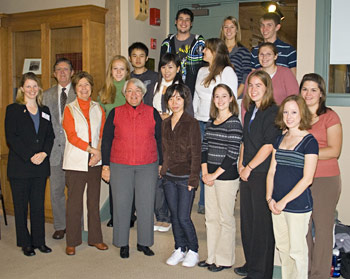An Extreme Learning Experience: The Wesson Honors Program
Every student who earns a college acceptance letter has worked hard to make the grade. They've pored over textbooks, joined sports teams, rehearsed plays and scores and songs, debated and created, yearbooked and reported, led their student governments and made their mark. At Colby-Sawyer, each class is comprised of these multi-talented students. Among them, about one in every 13, are the Wesson Honors students.

This ratio, according to Honors Coordinator and Professor of Humanities Ann Page Stecker, is approaching the 10 percent population that is just about right for a robust college's honors program. The 72 current honors students from six states, China and Ghana – 33 of whom are new to campus this year – represent a sustained dedication to, and careful cultivation of, academic excellence at Colby-Sawyer on the part of college administration, faculty, staff, and Jan and Bill Wesson.
Eligibility for the Wesson Honors Program requires students to have a 3.5 GPA and 1150SAT/25ACT score. They must then achieve Dean's List status (3.5 GPA) at least every other semester and take at least one honors course per year. To graduate with an honors certificate, students are required to complete six honors courses which constitutes, essentially, a second minor. The reward for taking on this extra work and worry is a $12,000 scholarship per year from the college, renewable annually for four years of study dependent upon good academic standing in the program.
“Our program is designed to provide highly motivated students with an optional intensive experience in the liberal arts,” says Professor Stecker. “By creating academic, cultural and social opportunities for integrative and interdisciplinary intellectual discovery, the program challenges students not only to widen their own avenues of intellectual exploration, but to take leadership in a community of scholars and participate as catalysts for inquiry and discussion across the college.”
honorificabilitudinitatibus ... say what?
On the fourth floor of Colgate Hall, in the former painting studios, is the refreshed, bright Honors Suite. Dedicated to the Wesson Honors Program's use, but open to all students two nights a week for study and to faculty as classroom space, the main room boasts a sign that, with 27 eight-inch high letters, takes up a good part of a wall: honorificabilitudinitatibus. Each honors student is required to learn how to pronounce the program's motto, borrowed from Shakespeare's “Love's Labour's Lost” and meaning honorableness.
“Our very playful and beloved motto should give a pretty good idea that the Wesson Honors Program is about minds at play, minds stretching and expanding, and looping backward and forward across rangy academic terrains,” says Professor Stecker. “The impertinent question – the glory and engine of human inquiry – that is the question we privilege in our honors program and hope to promote in discourse across the college.”
Students seek the answers to those “impertinent questions” in interdisciplinary courses – three per semester – that are taught in small, seminar settings and explored from several perspectives. Elisabeth Ryan '09, a Graphic Design major from Westminster, Mass., and layout editor of the program's newsletter honorificabilitudinitatibus, says the honors program has been a way to partake of the liberal arts.

“As an Art major, I don't really get to have a lecture and write papers, and the honors program really gave me that opportunity," says Ryan. "By doing more research or applying an interdisciplinary element to classes that aren't offered as an honors section, we can create honors contracts and receive honors credit. I did this with Nick Baer's Water Resources class and looked at how water is represented as an element in art. I wrote a series of papers that look at artists like Andrew Goldworthy. He's a Scottish sculptor who works a lot with ice, and the idea that we can't control nature - that's an important element to understand when looking at how we deal with water as a resource.
“I also studied Monet's water lily paintings, and what I didn't know before is that Monet actually had to go out and build that famous water lily garden. That wasn't something he stumbled across one day, it was a cow pond in his backyard and he diverted a little river to run through it to get the moving water he needed to transplant Japanese water lilies into France," Ryan continues. "There was a huge uproar; people were saying, 'You're going to poison our livestock with those things, what are you doing? You can't divert the river.' And all we know about it now is that there are 30-odd water lily paintings in every color and every degree of focus. So, it was kind of a different way to take art and science and put them together, to look at what went on behind the scenes of what we think we know.”
This kind of work has its rewards off campus, as well: Ryan's essay on the art/science connection, which Professor Stecker deems so sophisticated in its critical thinking that it should be published, recently won the essay prize and a $2,500 scholarship at the national meeting of Alpha Chi, the National College Honor Society.

How it All Began
Bill Wesson, a former corporate executive, retired to the area in the 1980s with his wife, Jan, and the couple soon engaged in their new community and Colby-Sawyer. In 1995, Bill joined the Colby-Sawyer Board of Trustees. When then-President Anne Ponder described her vision for a new, revitalized honors program that would help the college compete for top students, the Wessons felt the need was great to “really make something alive and important of it,” and so they agreed to support the honors program.
“There had been an honors program at the college for some time, but it wasn't really significant,” says Mr. Wesson. “It needed leadership, and it needed energy, and it needed visibility. We also wanted to make clear to the honors students that the idea was not for the honors program to be an elite, remote and detached academic group but to be a driving force throughout the college.”
In 2004, Jan and Bill Wesson created a bequest that provided an endowment in support of the college's honors program, ensuring its place at Colby-Sawyer. “A permanent endowment will ensure that the program will live on to inspire Colby-Sawyer's brightest, and provide models for the entire student body,” Mr. Wesson said then. “We hope that over time the honors program will serve to raise the college's academic standards to an even higher level.”
From Idea to Action
With encouragement and support from senior staff, Professor Ann Page Stecker was charged with turning an enormous idea into the driving force on campus that the Wessons envisioned. Today, Bill and Jan credit her with setting up the program and the methods of attracting honor students on a much broader scale than ever before, as well as inspiring her colleagues to join in the new academic challenge - there are now faculty in every department of the college who are either teaching an honors course or would like to. Next semester, Colby-Sawyer President Tom Galligan will teach a course, as will Fulbright Scholar-in-Residence Dr. Isaac Nyamongo, associate professor and Director of the Institute of African Studies at the University of Nairobi, Kenya.
Honors students get their first taste of what lies ahead for them in the program with the honors Pathway Betwixt and Between, taught by Professor Stecker. The honors Pathway counts for two of the six required honors courses.
“I consider teaching the honors Pathway such a privilege that I'm going to give it up next year and let someone else do it because it's time for someone else to have the pleasure that I have had in teaching it,” says Professor Stecker. “We call our Pathway “Betwixt and Between,” that is to say, the state of liminality, neither here nor there, but with all the advantages accruing to occupying any threshold – all the diversity of being in-between. My, what lively discussions we have.”
Those lively discussions bond the honors students together from the beginning, and introduce them to the level of work expected in college.
“I came to campus for a tour after I received a letter of acceptance,” says Madison Hawkins, a first-year student from Lancaster, Mass. “I met with Ann Page and immediately noticed that one whole wall of her office was books, floor to ceiling, and I thought, Oh my goodness. Then she started talking, and I thought, Oh my goodness. I knew her Pathway was going to be a challenge, but I also knew it would be the extreme learning experience that I want at college, so … that's why I'm involved with the honors program.”
Once a year, the extreme learning experience moves off campus to an urban setting for the Wesson Honors Weekend. The idea began, Professor Stecker says, when she heard Senator Paul Simon speak, just months before his death, about his vision for the nation's students - he wanted to found a program that would get students out of their comfort zone. “He wanted students to find out that there is another world, but also let the world find out about the best of us in hopes that we could lift up some of the fog of discord that we were beginning to feel then,” says Professor Stecker.
Inspired, she decided to put this next idea into action on a small level at Colby-Sawyer, and so was born the Wesson Honors Weekend, an ungraded, mini honors course. The first trip was to Seattle, Wash., Bill Wesson's birthplace, and then Charleston, S.C., Chicago, Ill., and most recently, Washington, D.C.
“I come from New Hampshire and had never really been to a big urban setting like Washington before,” says Rachel Smith, a junior Nursing major from Milford, N.H. “It was so great to get out of this small area and see all the cultures that were right there.”
Looking Ahead
With the Wessons' support, the program is now working on its first international trip, considering week-long explorations of London, Mexico City or Montreal. Las Vegas is a potential domestic destination, and Ann Page Stecker dreams of the day the program can offer two Honors Weekends each year.

Doubling the program's travel adventures isn't the only expansion plan – this year's large incoming group of 33 students raises the question of whether to offer two honors Pathways, something most Wesson Honors Advisory Group members favor – as it is, 13 of the 33 first-year students are in a Pathway other than the Honors offering, setting them back in fulfilling their six honors courses requirement, and making options like study away difficult.
Professor Stecker notes that while the program's gender breakdown of 50 women and 23 men is a little more lopsided than the college in general, and that there are no Business, Environmental, or History, Society and Culture majors currently in the group, the honors students are representative of the college as a whole and visible in every aspect of campus life, from leading admissions tours to playing rugby. She's also keeping in mind the goal of having 10 percent of the college's population in the honors program, and wants to focus next on student leadership within the program that can execute ways of giving back to the college.
“Jan and I are more enthused than ever about the honors program,” Bill Wesson told the President's Alumni Advisory Council in October, 2008. “We are intending to support it and hopefully provide some increased support because we both feel the honors program is awfully important to the future of Colby-Sawyer and we want to see it live on, and be bigger and better, for many years to come.”
-Kate Dunlop Seamans, November 2008


